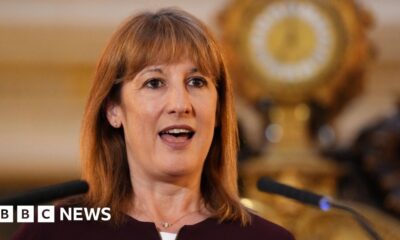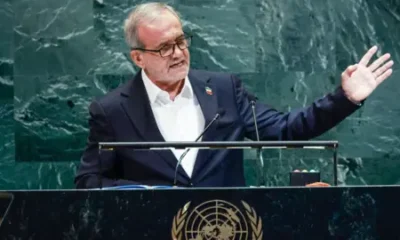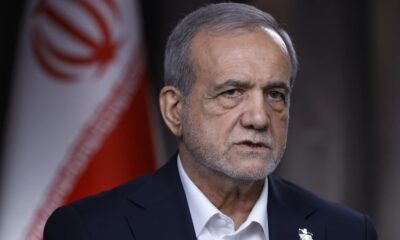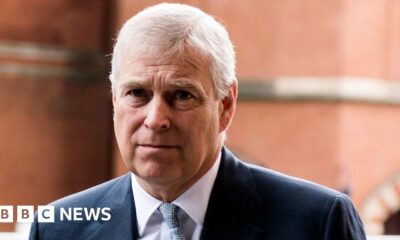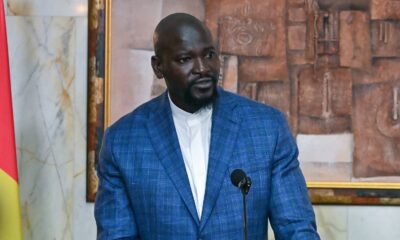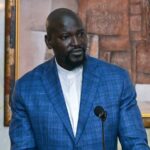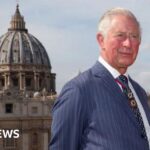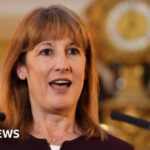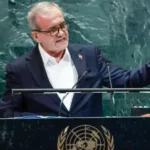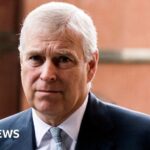Business
Huntington’s breakthrough ‘like winning the lottery 10 times over’
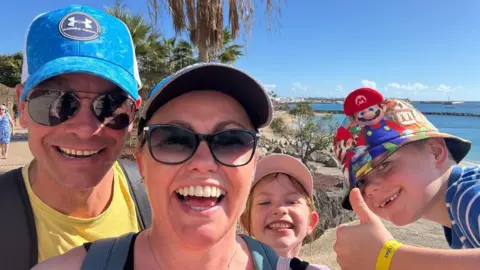
Read full article on post.
Nick TriggleBBC News
Gemma Botting burst into tears when she saw the news headlines this week about a treatment for Huntington’s.
“I must have cried for three hours. Then the kids got home from school and I showed my daughter the BBC story and she burst into tears.”
Gemma’s husband, Matt, was diagnosed with Huntington’s disease in 2011. The condition resembles a combination of dementia, Parkinson’s and motor neurone disease (MND) and is normally fatal within two decades after symptoms start to show. Matt became symptomatic two years ago.
Until now there has been no treatment. But on Wednesday researchers reported how a new gene therapy had managed to slow progress of the disease by 75%.
“It is like winning the lottery 10 times over,” says Gemma, 45. “I had accepted I would never get to grow old with my husband and that he might never see the kids become adults. That has all changed now.”
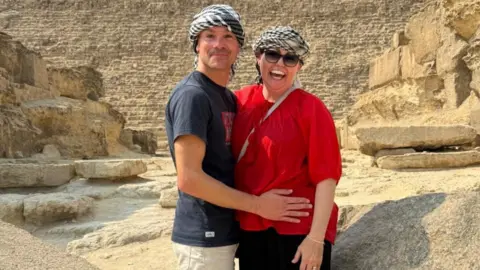 Gemma Botting
Gemma BottingMaking the most of their time together
Gemma, who lives just outside Swindon with Matt and their two children, Amelie, 11, and Hugo, eight, says they have tried to make the most of the time they have had together.
When he was diagnosed, they took a break from their jobs in the logistics industry to travel the world. “We went for a year – got all our holidays in at once before we had the children,” Gemma says.
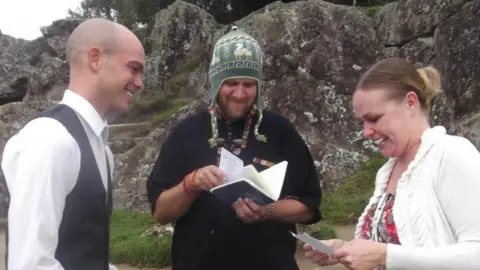 Gemma Botting
Gemma BottingBut even having children was something that took some navigating. They decided they wanted to screen out the gene that causes the disease. They had two options – either have a version of IVF whereby the embryo is tested for the gene before implantation, or conceive naturally and have the developing embryo tested.
They opted for the latter, but to be eligible for this couples have to agree to abort the foetus if the test is positive, as it was in their second pregnancy.
“We thought carefully about what we wanted to do. In the Huntington’s community not everyone agrees with screening it out. But we both knew we did not want our children growing up with the possibility of having this gene. It is such a cruel, cruel disease.”
‘Hope where there was no hope’
Matt, now 43, is still able to walk, but has become clumsy with his movement and also been affected mentally.
“He has angry outbursts and has no empathy altogether. For example, if one of the children hurts themselves he will laugh. It’s worse when he’s tired. That’s how Huntington’s works – it alters your personality and that is incredibly hard for the children to understand.”
Matt no longer works, having had to retire on health grounds when his symptoms started to develop.
“In some ways we are lucky he got past 40 with no signs of it,” says Gemma. “His mother died from the disease when she was 40. And now we have the prospect of a treatment. We have got hope where there was no hope.”
She says that is a sentiment that will be felt by the whole Huntington’s disease community.
“I work in the evenings as a counsellor, often with people with Huntington’s disease. I trained partly to give something back to the community and because we needed the money as Matt is no longer earning.
“I often support people just after they have been tested for it. Depression is the most common issue as they feel all is lost. That is why the news about the treatment is so important. It will give everyone a lift,” she explains.
“Our neighbours and friends are even talking about fundraising so we can pay for the treatment. I just hope it is made available on the NHS quickly.”
That, of course, is the question on the mind of everyone who has been affected by the disease.
The BBC has been contacted by numerous families who have lost whole generations to the illness and others who have lost their loved ones to suicide because they were unable to face the inevitable decline that follows a diagnosis.
Dave, 73, from the West Midlands, lost his wife to Huntington’s. His son now has the disease and he is worried the gene may have been passed on to his granddaughter.
“It is horrible to see your loved ones suffer,” he says. “This treatment is desperately needed on the NHS.”
The path to the NHS
Whether and how quickly the treatment will become available is not yet clear.
The company behind the therapy, uniQure, says it will apply for a licence in the US in the first quarter of 2026.
Once regulators there have assessed it and, if they approve it for use, the UK regulator, the Medicines and Healthcare Regulatory Agency (MHRA), can piggyback off their work and put it through a quick regulatory process.
But that is only to decide if it is safe and effective. It will be up to another body, the National Institute for Health and Care Excellence (NICE), to decide if it is affordable to be used on the NHS in England and Wales. A separate body makes that calculation for Scotland.
As a gene therapy involving brain surgery, it will be expensive. However, sources at NICE say that is not necessarily a deal-breaker. They point to the fact that a sickle cell therapy that costs £1.65 million per patient and a haemophilia B one that cost £2.6 million have already been backed by the health assessment body.
Sources there said the earliest the Huntington’s therapy could possibly be expected to be approved is the first half of 2027.
But that’s only if everything else goes smoothly – and there are more hurdles to overcome.
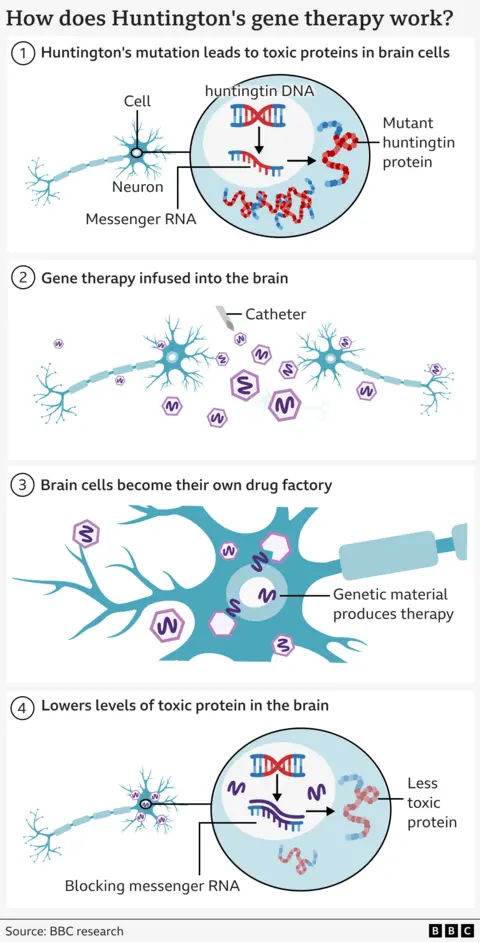
So far, just the headline findings have been released. Scientists say the full study needs to be published and assessed by independent experts to properly assess what has been achieved.
The study is also relatively small – there were just 29 participants who were followed for 36 months. This is not unusual for gene therapies, and others have made it onto the NHS off the back of small-scale trials. The case for this treatment is particularly strong given there are no current treatment options for the disease.
But even if this therapy is licensed, it is only going to help a small portion of Huntington’s disease patients as it’s aimed at those with early-stage symptoms or those who haven’t developed any yet. The complex nature of the surgery also means only specialist centres will be able to perform it.
Some scientists have pointed out that it is not yet certain the benefits will last long-term.
But Prof David Rubinsztein, deputy director of the Cambridge Institute for Medical Research, says the scale of this breakthrough should still not be underestimated.
He says it offers “real hope” for this devastating disease and if the approach is successfully validated in the coming months it could even have broader implications for treating other neurodegenerative diseases from Parkinson’s disease and MND to dementia.
Gemma appreciates there is still some way to go before Matt can benefit, but she says for the first time in a long time she can be optimistic about the future.
“It’s like a dream – I can start thinking about growing old with my husband. That would mean the world to me and my children.”
What is Huntington’s disease?
Huntington’s disease is caused by an error in part of our DNA called the huntingtin gene.
If one of your parents has Huntington’s disease, there’s a 50% chance that you will inherit the altered gene and will eventually develop Huntington’s too.
This mutation turns a normal protein needed in the brain – called the huntingtin protein – into a killer of neurons.
The goal of the treatment is to reduce levels of this toxic protein permanently, in a single dose.
The therapy uses cutting edge genetic medicine combining gene therapy and gene silencing technologies.
Business
Reeves pushes for EU youth migration scheme ahead of Budget
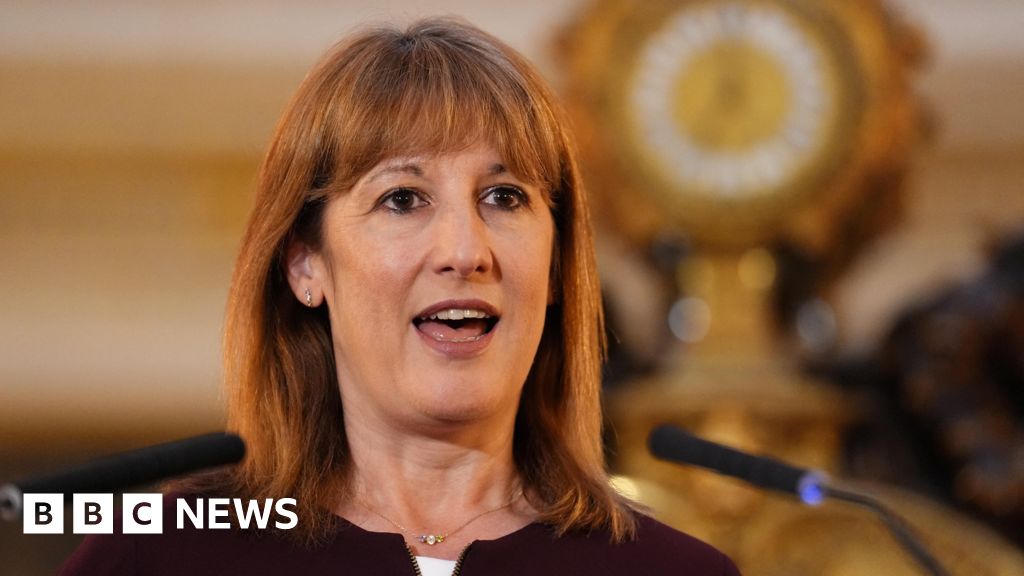
Read full article on post.
Rachel Reeves has pushed for an “ambitious” youth migration deal with the EU in a bid to improve the outlook of the public finances ahead of the autumn Budget.
The Chancellor told the Times an exchange scheme for young workers would be “good for the economy, good for growth and good for business”.
The UK agreed to work towards a “youth experience visa” with the EU in May this year but the specifics of the scheme are still being negotiated.
Reeves also called for the Office of Budget Responsibility (OBR) to factor the potential economic impact of such a scheme into its forecasts ahead of the Budget, which she hopes will reduce the need for spending cuts or tax rises.
The proposal has previously been criticised by the Conservatives and Reform UK, who have said it amounts to a partial return to freedom of movement, which ended when the UK left the EU.
Speaking to the Times ahead of the Labour Party’s conference in Liverpool this week, Reeves said the youth visas would be time-limited, with those aged 18 to 30 allowed to stay for two years and given no right to remain.
The chancellor declined to specify how many visas could be issued annually under the scheme.
The UK already has similar schemes with 11 countries including Australia, New Zealand and Japan, with people able to stay for up to three years depending on where they apply from.
Under those agreements, the UK issued just over 24,000 youth mobility visas in 2024.
The OBR has previously scored UK growth down by 4% due to the original Brexit deal.
The chancellor believes that has set a precedent and that the OBR should include the projected economic upsides of a youth mobility scheme into its upcoming forecast.
Referencing the agreement between London and Brussels earlier this year, Reeves told the Times: “As a result of that reset in May, we think the economy will be stronger. We also want the OBR to score that.”
The OBR will send its first economic forecast to the treasury on Friday, which will include the gap the chancellor will need to make up in her 26 November Budget.
Much is depending on the OBR’s expected downgrade to the underlying long-term performance of the economy, or productivity. The gap could be £20 or £30 billion per year.
In response, the Chancellor has stressed a series of measures aimed to help the economy grow faster, including further trade deals.
If accepted by the independent forecasters, the inclusion of the proposed EU youth mobility scheme into its calculations could theoretically limit the extent of any new tax rises.
The OBR has scored policy moves on house building and childcare as helpful to the economy in recent years.
Speculation has been rife that the chancellor will be forced to raise taxes or cut spending in order to fill the fiscal hole, despite Labour’s election promise not to increase income tax, National Insurance or VAT for working people.
Business
UN sanctions against Iran to resume over banned nuclear activity
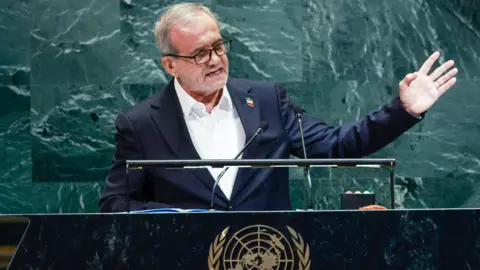
Read full article on post.
Lyse DoucetChief international correspondent, New York and
Raffi Berg
The United Nations’ sweeping economic and military sanctions look set to be reimposed on Iran a decade after they were lifted in a landmark international deal over its nuclear programme.
It comes after the UK, France and Germany wrote to the UN Security Council last month, accusing Iran of failing to fulfil its commitments. That triggered a mechanism giving Iran 30 days to find a diplomatic solution to avert renewed sanctions.
Iran’s President Masoud Pezeshkian condemned the re-imposition of international sanctions as “unfair, unjust, and illegal”.
A last-minute resolution, led by China and Russia, to delay the move by six months only received four votes in the 15-member council.
Iran stepped up banned nuclear activity after the US quit the deal in 2016. Donald Trump pulled the US out in his first term as US president, criticising the deal – the Joint Comprehensive Plan of Action (JCPOA) – negotiated under his predecessor Barack Obama as flawed.
Iran barred IAEA inspectors from accessing its nuclear facilities after Israel and the US bombed several of its nuclear sites, as well as military bases, in June after negotiations held indirectly between the US and Iran to try to reach a new nuclear deal became deadlocked.
President Pezeshkian told the UN this week that his country would never seek to build a nuclear bomb.
Speaking to a group of journalists, Pezeshkian accused foreign powers of seeking a superficial pretext to set the region ablaze, insisting that, despite previous threats, Iran would not quit the Non-Proliferation Treaty.
But he added that Tehran would need reassurances that its nuclear facilities would not be attacked by Israel in order to normalise its nuclear enrichment programme.
Pezeshkian kept pointing to the negotiations which had taken place before Israel and the US bombed Iran’s nuclear sites in June and accused the Americans of not taking the talks seriously. The sanctions add yet more strain to an already fraught situation.
The sanctions would include:
- an arms embargo
- a ban on uranium enrichment
- a ban on activity connected to ballistic missiles capable of delivering nuclear weapons
- a freeze of assets and a travel ban on Iranian figures and entities
- authorisation of countries to inspect Iran Air and Iran Shipping Lines cargo
 Reuters
ReutersUnless a solution is found, UN sanctions would come into force first, followed by EU sanctions next week.
European foreign ministers had tried to avert the council’s step by urging Iran to resume negotiations with the US; to cooperate with the UN’s nuclear watchdog the IAEA, and to account for its highly enriched uranium stockpile.
Speaking at the UN on Friday, Iranian Foreign Minister Abbas Aragchi said: “The United States has betrayed diplomacy, but it is the E3 (Britain, Germany and France) which have buried it.”
“The negotiation with the United States is in fact a pure dead end,” Aragchi added.
Iran is legally obliged under the nuclear treaty to allow inspections.
It has been in talks this week with the IAEA to find a way forward, but has warned that a return of sanctions will put that in jeopardy.
On Friday, the IAEA confirmed that inspections of Iranian nuclear sites had resumed this week after a hiatius following Washington and Israel’s strikes.
Western powers and the IAEA say they are not convinced that Iran’s nuclear programme has purely peaceful purposes.
Iran strongly insists it is not seeking nuclear weapons, and that its programme is solely a civilian one.
Russia on Friday signed a $25bn deal with Iran to build four nuclear power reactors in southern Iran, Iranian state-run IRNA news agency reported.
Business
Elon Musk and Prince Andrew named in new Epstein files
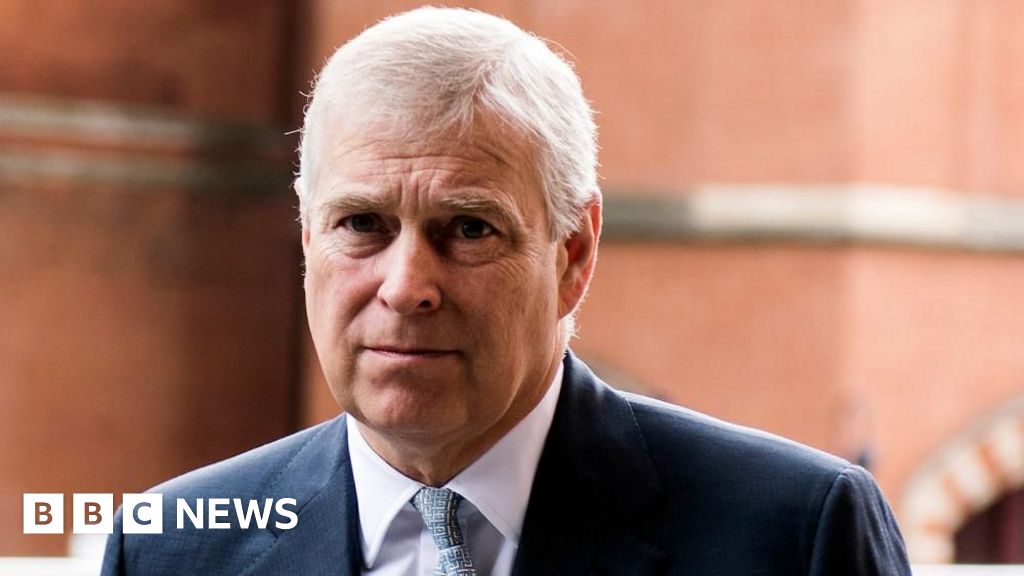
This post was originally published on this site.
Billionaire Elon Musk and Prince Andrew are named in new files released by Congressional Democrats that relate to the late convicted sex offender and financier Jeffrey Epstein.
The files turned over to the House Oversight Committee by the Jeffrey Epstein Estate appear to show that Musk had been invited to Epstein’s island in December 2014.
Separately a manifest for a flight from New Jersey to Florida in May 2000 names Prince Andrew among the passengers.
Musk and Prince Andrew have been approached for comment.
Prince Andrew has previously strenuously denied any wrongdoing. Musk has previously been quoted as saying that Epstein had invited him to the island but he had declined.
The partial records are from the third batch of documents produced by the Jeffrey Epstein Estate. Democrats on the House Oversight Committee say they include phone message logs, copies of flight logs and manifests for aircrafts, copies of financial ledgers and Epstein’s daily schedule.
In addition to Musk and Prince Andrew, the files released publicly also contain the names of other prominent figures including internet entrepreneur Peter Thiel and Steve Bannon, a former advisor to Donald Trump
One line in the records dated 6 December 2014 reads: “Reminder: Elon Musk to island Dec. 6 (is this still happening?)”
A flight manifest records that Prince Andrew was on a flight with Epstein and his associate Ghislaine Maxwell from Teterboro, New Jersey, to West Palm Beach, Florida, on 12 May 2000. Maxwell was convicted in 2021 of conspiring with Epstein to traffic girls for sex.
One heavily redacted ledger records two references of payments for massages for an ‘Andrew’ in February and May 2000. While Palace records, photographs and press reports from the time indicate Prince Andrew had travelled to the US around the time of the dates recorded in the newly released document, it is not clear who the ‘Andrew’ referred to in the ledger is.
On 11 May 2000, Buckingham Palace said on its website that Prince Andrew had flown to New York to attend a reception in New York for the National Society for the Prevention of Cruelty to Children. Andrew returned to the UK on 15 May, a later entry said.
In the files, there is also an entry referring to a planned lunch with Peter Thiel in November 2017.
There is also an entry referring to a planned breakfast with Steve Bannon 17 February 2019.
The files also mention tentative plans for a breakfast party with Microsoft founder Bill Gates in December 2014. In 2022 Gates told the BBC that meeting Jeffrey Epstein had been a “mistake”.
It is not suggested that those mentioned in the files were aware of the alleged criminal activity for which Epstein was later arrested.
Epstein died by suicide in a New York jail cell in August 2019 while awaiting trial on sex trafficking charges.
In 2008, he reached a plea deal with prosecutors after the parents of a 14-year-old girl told police in Florida that Epstein had molested their daughter at his Palm Beach home.
He was arrested again in July 2019 on sex trafficking charges.
Sara Guerrero, a spokesperson for the Democrats on the committee, urged Attorney General Pam Bondi to release more files related to Epstein.
“It should be clear to every American that Jeffrey Epstein was friends with some of the most powerful and wealthiest men in the world. Every new document produced provides new information as we work to bring justice for the survivors and victims,” she said.
Republicans on the committee accused the Democrats of “putting politics over victims” and said they would release the full set of documents soon.
-
Politics4 days ago
European Parliament snubs Orbán with vote to shield Italian MEP from Hungarian arrest
-
Culture3 weeks ago
Life, loss, fame & family – the IFI Documentary Festival in focus
-
Culture2 months ago
Fatal, flashy and indecent – the movies of Adrian Lyne revisited
-
Environment1 week ago
Key oceans treaty crosses threshold to come into force
-
Health5 days ago
EU renews support for WHO’s Universal Health Coverage Partnership
-
Culture1 week ago
Farewell, Sundance – how Robert Redford changed cinema forever
-
Culture4 days ago
Twilight at 20: the many afterlives of Stephenie Meyer’s vampires
-
Culture4 weeks ago
What is KPop Demon Hunters, and why is everyone talking about it?



